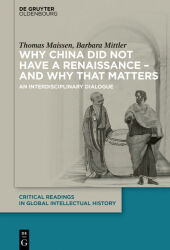 Neuerscheinungen 2018Stand: 2020-02-01 |
Schnellsuche
ISBN/Stichwort/Autor
|
Herderstraße 10
10625 Berlin
Tel.: 030 315 714 16
Fax 030 315 714 14
info@buchspektrum.de |

Thomas Maissen, Barbara Mittler
(Beteiligte)
Why China did not have a Renaissance - and why that matters
An interdisciplinary Dialogue
2018. 255 S. 10 b/w ill. 230.00 mm
Verlag/Jahr: DE GRUYTER; DE GRUYTER OLDENBOURG 2018
ISBN: 3-11-057396-2 (3110573962)
Neue ISBN: 978-3-11-057396-1 (9783110573961)
Preis und Lieferzeit: Bitte klicken
The series facilitates access to the fast-moving discussion about Global Intellectual History from the sixteenth to the twentieth centuries. It provides a forum for new methodological approaches and unconventional formats. Every volume engages in a critical reading of the state of research and explicitly reflects on its methodological toolkit.
Concepts of historical progress or decline and the idea of a cycle of historical movement have existed in many civilizations. In spite of claims that they be transnational or even universal, periodization schemes invariably reveal specific social and cultural predispositions.
Our dialogue, which brings together a Sinologist and a scholar of early modern History in Europe, considers periodization as a historical phenomenon, studying the case of the "Renaissance." Understood in the tradition of J. Burckhardt, who referred back to ideas voiced by the humanists of the 14th and 15th centuries, and focusing on the particularities of humanist dialogue which informed the making of the "Renaissance" in Italy, our discussion highlights elements that distinguish it from other movements that have proclaimed themselves as "r/Renaissances," studying, in particular, the Chinese Renaissance in the early 20th century.
While disagreeing on several fundamental issues, we suggest that interdisciplinary and interregional dialogue is a format useful to addressing some of the more far-reaching questions in global history, e.g. whether and when a periodization scheme such as "Renaissance" can fruitfully be applied to describe non-European experiences.
Thomas Maissen, Deutsches Historisches Institut, Paris, Universität Heidelbert; Barbara Mittler, Universität Heidelberg.


